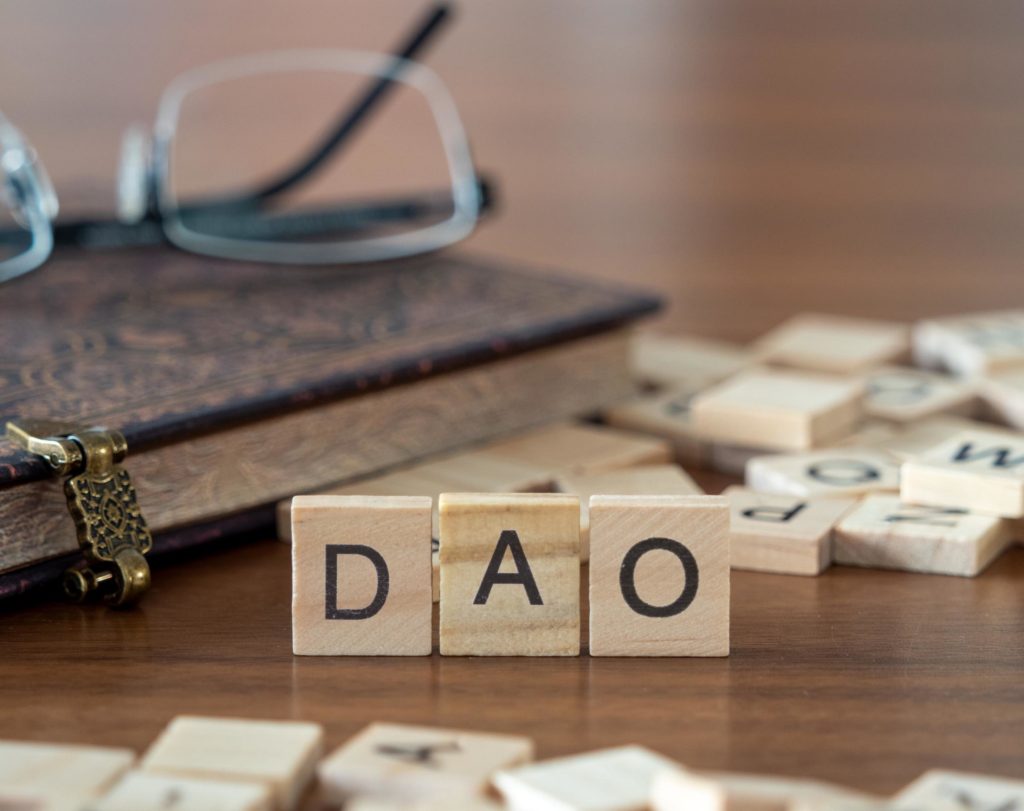A Decentralized Autonomous Organization (DAO), (Sometimes also referred to a Decentralized Autonomous Corporation (e.g. [Kypriotaki 2015])) is a type of smart contract executing as an autonomous organizational entity in the context of a blockchain. Note that the “smart” in smart contract does not require or imply the use of AI (though it is also not prohibited), it refers to automation in the design and execution of legally enforceable contracts. DAOs were originally envisioned as a pseudo-legal organization run by an assemblage of human and robot participants [Vitalik 2013a], [Vitalik 2013b], [Vitalik 2013c]. More recently [Wang 2019] proposed a definition of a DAO as a blockchain-powered organization that can run on its own without any central authority or management hierarchy, and a five-layer architecture reference model. The legal status of DAOs is continuing to evolve. In the absence of specific enabling legislation, There have been proposals that DAOs be considered a trust administrator [Jentzsch 2015] , or a form of (implied) partnership [Zetsche 2018], or be construed as falling within existing LLC enabling statues [Bayern 2014], or requiring new enabling legislation for Cryptocorporations [Nielsen 2018]. Meanwhile, some states (e.g., Vermont [Vermont 2018]) have created enabling legislation recognizing blockchain based LLCs.

DAOs have been proposed in a number of different applications. [Zichichi 2019] proposed a DAO for crowdfunding applications. [Mylrea 2019] proposed a blockchain entity similar to a DAO in the context of energy markets. [Miscione 2019] reviewed blockchain as an organizational technology in the context of both markets and public registries. [Calcaterra 2019] proposed a DAO for underwriting insurance. [Diallo 2018] proposed DAO applications in e-government. DAOs are built on top of blockchain smart contracts. The scope of smart contracts can include off-chain computations, and a wide variety of token types and cyberphysical devices (see e.g., [Wright 2019]). Smart contracts can be used in the execution of a broad array of contracts.
An organization needs to be able to adapt to changes in its environment. Such adaptation in a software entity requires configuration control, mechanisms to clean up old versions etc. This is complicated in the case of blockchains where the software code may be stored as part of the “immutable” block. A key decision point in such adaptations lies in the selections of adaptation to support. In the context of decentralized systems, this is complicated because of multiple parties interacting in a decentralized fashion. This decision process in the evolution of a DAO is generally described in the literature as the governance mechanism for the DAO. Some blockchain architectures (e.g., Tezos) support governance mechanisms inherently, others would require the governance to be build into a higher layer dapp – in this case a DAO. The need for such governance became widely recognized in the aftermath of an early DAO implementation. [Jantzsch 2015] implemented[1] a DAO as smart contracts on Ethereum. After the reentrancy exploit in 2016 of a coding flaw resulted in considerable financial loss, the flaw was resolved through a hard fork [Mehar 2019]. [Avital 2019] identified three classes of governance mechanisms: control, coordination, and realignment, and compared governance practices in centralized and decentralized organizations; arguing that interpretations of governance mechanisms in near-autonomous or stigmergic (indirectly coordinated) forms of a decentralized organization require a theoretical taxonomy emphasizing process over structure. [Notra 2015] proposed a governance as a service model for collaborating DAOs. Governance mechanisms are an ongoing challenge for blockchains, not just DAOs, but DAOs as a legal entity require additional consideration of who is legally authorized to make such upgrades.
The notion of a DAO as a new paradigm for organizational design has sparked the imagination of some commentators (e.g. [Hsieh 2018], [Wooley 2016], [Koletsi 2019]), but the underlying performance and capacity of many current blockchain protocols remain technical impediments to that vision. There have been some performance improvements; for example, [Barinov 2019] introduced a Proof of Stake DAO improving performance of consensus mechanisms over prior Proof of Work blockchains. There are a variety of platforms [Clincy 2019] for implementing blockchains, smart contracts, and thus DAOs. Some claim [Hsieh 2018] that bitcoin itself is a form of DAO. DAOs could be implemented in permissionless blockchains or permissioned blockchains [Wang 2019]. The most (in)famous example was implemented on Ethereum [Dupont 2017]. [Alimoglu 2017] proposed an organization design for DAOs featuring a crypto currency funding mechanism, a decision mechanism based on voting and released[2] an Ethereum/ Solidity implementation under a GNU GPL v3.0 license. DigixDAO[3] aims to be a self-organizing community on the Ethereum blockchain that actively involves its token holders in decision making and shaping the direction of the asset tokenization business. Members of the Ethereum community have pooled funds together to distribute grants effectively through a DAO structure (MolochDAO[4] [Soleimani 2019]). OpenLaw[5] provides a support mechanism for formation of various legal entity types for DAOs. DAOstack[6] is building an open source software stack for implementing DAOs. DatabrokerDAO [7]appears to be launching a DAO based data service. MakerDAO supports transactions in collateralized debt positions.
While some (e.g., [Lopucki 2018]) have questioned the wisdom of aligning software entities with legal entities, DAOs seem to be in various stages of implementation and operation with some color of law enabling legal recognition. Some (e.g., [Field 2020]) are predicting significant commercial DAO progress in 2020. While example DAOs have been in operation for more that 5 years now, consensus on the required functionality for DAOs is still emerging. While the decentralized nature of DAOs is perhaps unfamiliar to some, it, and the notion of a virtual entity like a corporation are widely understood. The notion of autonomy in this context could use some further elaboration, and perhaps even categorization or quantification. DAOs by definition include some notion of autonomy, but what is required for a smart contract to rise to the level of a DAO is not exactly clear. Autonomy implies some aspect of free-will and self-determination, but it is not clear that truly independent decision making is expected in the DAO applications so far. The objectives for DAO applications above seem to be in the nature of an entity that can be trusted to perform in some expected manner. The smart contracts underlying a DAO employ logical programming to execute their contractual objectives; that logical basis provides an explanation of behavior even when unexpected (e.g. due to some reentrancy flaw); and behavior explanations are often unavailable in artificial intelligence applications (e.g., those based on machine learning). Legal recognition as an entity implies not only a capacity for independent action, but also some duties (e.g. duties to responding to other legal processes, obligations toward others (e.g., shareholders, employees)). Other virtual entities (e.g., corporations) rely on designated humans to perform these functions. The argument for implementing a DAO is to minimize the human role in favor of automation. Corporations also provide a feature of limited liability. Many of the DAO applications are manipulating digital assets of considerable value and so considerations of liability if those valuable digital assets were to be lost, damaged or degraded. Where the DAO extends smart contract to cyber-physical assets or other tokenized assets the potential liabilities may become important considerations. So how much autonomy is then required for a DAO to be a DAO?
References
[Alimoglu 2017] A. Alimoğlu, & C. Özturan. “Design of a Smart Contract Based Autonomous Organization for Sustainable Software.” 13th Int’l Conf. on e-Science. IEEE, 2017.
[Avital 2019] M. Avital, et. al., (2019). “Governance of Decentralized Organizations: Lessons from Ethereum.” 11th Int’l Process Symposium Organizing in the Digital Age. PROS 2019, Chania, Crete, Greece.
[Barinov 2019] I. Barinov, et al. “POSDAO: Proof of Stake Decentralized Autonomous Organization.” Available at SSRN 3368483(2019).
[Bayern 2014] S. Bayern, “Of bitcoins, Independently wealth software and the zero member LLC”, Northwestern U. Law Rev. vol 108, pp 257-270, 2014
[Buterin 2013a] V. Buterin, “Bootstrapping A Decentralized Autonomous Corporation: Part I” Bitcoin Magazine Sept 20, 2013
[Buterin 2013b] V.Buterin, “Bootstrapping An Autonomous Decentralized Corporation, Part 2: Interacting With the World”, Bitcoin Magazine, Sept. 22, 2013
[Buterin 2013c] V. Buterin, “Bootstrapping a Decentralized Autonomous Corporation, Part 3: Identity Corp”, Bitcoin Magazine, Sept 25, 2013
[Buterin 2014] V. Buterin, “DAOs, DACs, DAs and More: An Incomplete Terminology Guide”, Ethereum Blog, May 6, 2014
[Calcaterra 2019] C. Calcaterra, et.al., “Decentralized Underwriting.” Available at SSRN 3396542(2019).
[Clincy 2019] V. Clincy, & H. Shahriar. “Blockchain Development Platform Comparison.” 43rd Ann. Computer Software and Applications Conference (COMPSAC). Vol. 1. IEEE, 2019.
[Diallo 2018] N. Diallo, et al. “eGov-DAO: A better government using blockchain based decentralized autonomous organization.” 2018 International Conference on eDemocracy & eGovernment (ICEDEG). IEEE, 2018.
[DuPont 2017] Q. DuPont, “Experiments in algorithmic governance: A history and ethnography of “The DAO,” a failed decentralized autonomous organization.” Bitcoin and Beyond (Open Access). Routledge, 2017. 157-177.
[Field 2020] M.Field “The DAO Spring is coming”, Medium, Jan 1, 2020
[Hsieh 2018] Y. Hsieh, et. al. ,”Bitcoin and the rise of decentralized autonomous organizations.” J. of Organization Design7.1 (2018): 14.
[Jentzsch 2015] C. Jentzsch, “Decentralized autonomous organization to manage a trust.” White Paper (2015)
[Kypriotaki 2015] K. Kypriotaki, et.al., “From bitcoin to decentralized autonomous corporations.” International conference on enterprise information systems. 2015.
[Koletsi 2019] M. Koletsi, “Radical technologies: Blockchain as an organizational movement.” Homo Virtualis 2.1 (2019): 25-33.
[Lopucki 2018] L. Lopucki, “Algorithmic Entities”, Washington U. Law Rev., vol 95, no 4, pp 887-953, 2018
[MakerDAO 2020] MakerDAO Whitepaper https://makerdao.com/en/whitepaper/ retrieved 1/2/2020
[Mehar 2019] M. Mehar, et al. “Understanding a revolutionary and flawed grand experiment in blockchain: the DAO attack.” J. of Cases on Inf. Tech. (JCIT) 21.1 (2019): 19-32.
[Miscione 2019] G. Miscione, “Blockchain as organizational technology.” University of Zurich, Department of Informatics IFI Colloquium, Zurich, Switzerland, 28th February 2019. University College Dublin, 2019.
[Mylrea 2019] M. Mylrea, “Distributed Autonomous Energy Organizations: Next-Generation Blockchain Applications for Energy Infrastructure.” Artificial Intelligence for the Internet of Everything. Academic Press, 2019. 217-239.
[Nielsen 2018] T. Nielsen, “Cryptocorporations: A Proposal for Legitimizing Decentralized Autonomous Organizations.” Utah Law Review, Forthcoming (2018).
[Norta 2015] A. Norta, et. al., “Conflict-resolution lifecycles for governed decentralized autonomous organization collaboration.” Proc. 2nd International Conference on Electronic Governance and Open Society: Challenges in Eurasia. ACM, 2015.
[Soleimani 2019] A. Soleimani, et.al., “The Moloch DAO: Beating the Tragedy of the Commons using Decentralized Autonomous Organizations”, Whitepaper, 2019
[Vermont 2018] Vermont S.269 (Act 205) 2018 §4171-74
[Wang 2019] S. Wang, et al. “Decentralized Autonomous Organizations: Concept, Model, and Applications.” IEEE Transactions on Computational Social Systems 6.5 (2019): 870-878.
[Woolley 2016] S.Woolley,& P.Howard. “Automation, algorithms, and politics| political communication, computational propaganda, and autonomous agents Introduction.” Int’l J. of Communication 10 (2016): 9.
[Wright 2019] S. Wright, “Privacy in IoT Blockchains: with Big Data comes Big Responsibility”, Int’l Workshop on IoT Big Data and Blockchain (IoTBB’2019) in conjunction with IEEE Big Data (2019)
[Zetsche 2018] D.Zetsche, et.al., “The distributed Liability of distributed ledgers” U. Ill. L.Rev. 2018.
[Zichichi 2019]
M. Zichichi, et al. “LikeStarter: a Smart-contract based Social DAO for
Crowdfunding.” arXiv preprint arXiv:1905.05560 (2019).
[1] https://github.com/slockit/DAO/
[2] https://github.com/ebloc/AutonomousSoftwareOrg
[3] https://digix.global/dgd/
[4] https://molochdao.com
[5] https://dao.openlaw.io/formation
[6] https://daostack.io
[7] https://databrokerdao.com
